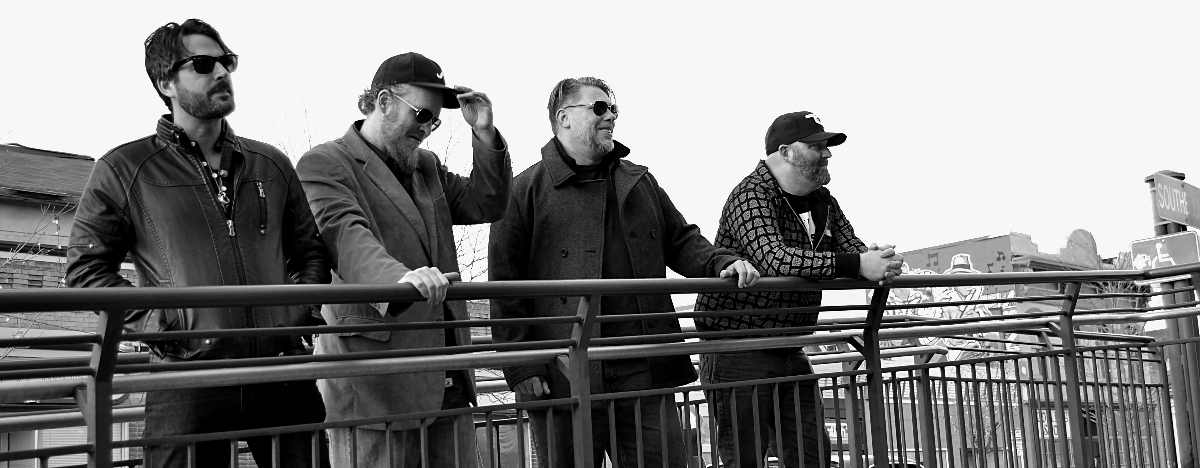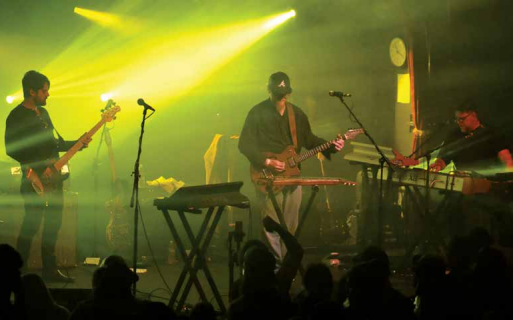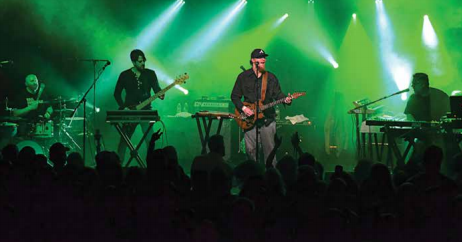Perpetual Groove: Redemption Song

Photos via ALOC Media
It’s the second night of Perpetual Groove’s sold-out engagement at New York’s Brooklyn Bowl, and Brock Butler is standing alone onstage. As smoke slowly envelops him, the 36-year-old guitarist begins to strum the innocent chords to “Life,” the opening track of Perpetual Groove’s 2004 album, All This Everything, a gentle instrumental that has come to serve as a poignant reminder of his band’s often emotional, lonely and difficult world.
Eventually, as the song begins to flourish, Butler’s longtime bandmates—bassist Adam Perry, keyboardist Matt McDonald and drummer Albert Suttle—emerge from the wings and join him onstage, offering support and the much-missed sonic soundscapes that have defined PGroove—as they are affectionately known to fans—since their early days on the Southeast club circuit nearly 20 years ago.
These packed Brooklyn Bowl performances are PGroove’s first New York plays since the group’s core four members reunited at the Georgia Theatre in Athens this past May. This followed a two-year hiatus and almost a decade of inner turmoil and personnel swaps, often spurred on by Butler’s struggles with addiction.
Despite their rocky trajectory, the group’s classic lineup remains razor-sharp onstage, a constant reminder of why PGroove gradually became one of the jamband scene’s greatest hopes at the dawn of the modern indie-rock era and drew thousands of fans to marquee stages at Bonnaroo, Jam Cruise and High Sierra. They are responsible for some of the best psychedelic-rock records of the early aughts and, as the hippe-rock festival scene gradually became more eclectic, they served as a natural conduit between the sounds of The Flaming Lips and Phish.
“Since getting in the same room and playing music together again, there’s a lot of mutual respect and love and brotherhood and camaraderie,” McDonald says of their recent reunion, acknowledging, without getting too spiritual about it, that the music itself is very real. “All the energy coming from the fans—that’s why people love to go to shows, that’s why we make music, for that.”
Though Perpetual Groove’s current lineup first played together in 2001, the group actually has a pre-history that dates back a little earlier to when Butler met Perry at the Savannah College of Art and Design in 1997. After jamming together and realizing their shared love for the sound and production techniques that they were studying in film classes, Butler and Perry formed an embryonic version of PGroove with keyboardist Brett Hinton and drummer Joe Stickney. The group remained together through college and even released a self-titled album, before Hinton and Stickney moved on once the other two decided to take the project on the road.
“Coming out of high school, I was listening to a lot of stuff like Sublime, and that was coming through in our playing,” Butler told Jambands.com in 2005. “But Joe was from Alabama, and he turned me on to John Scofield and Medeski Martin & Wood—that was a real big change for me, hearing A Go Go. (Stickney later went on to find blog buzz with Bear In Heaven.)
After a chance encounter at an open-mic night, Butler and Perry started playing with McDonald and Suttle, both of whom were actively enlisted in the U.S. Army, and served in the U.S. Army Band, and they began to balance their commitments to PGroove with their military assignments.
Thanks to regular gigs at J.J. Cagney’s in Savannah, the group found their feet onstage and whipped their live show into shape. PGroove started barnstorming through the South, moving to Athens and developing into a house band at the city’s crown jewel, the Georgia Theatre, eventually expanding their reach throughout the country and internationally. (Their name was so synonymous with the Georgia Theatre that the club even helped throw Perry a surprise 30th birthday party.)
Each member of the quartet grew into their roles: Butler remained the emotive center of the PGroove universe; Perry served as the outfit’s badass, rock-and-roll heartthrob; McDonald functioned as their multi-talented sonic maestro and de facto spokesman; and Suttle, a gentle giant, who allows his witty T-shirts to do most of his talking for him, was a thunderous presence behind the kit.
With a sound that married fourth-wave jamband styles like groove-funk, spacerock and light livetronica with the founding members’ keen interest in cinematic production and an overall appreciation for covering modern rockers like Secret Machines and LCD Soundsystem, PGroove were pegged as their generation’s shining stars. For a while, they leapfrogged around the country with peers like Umphrey’s McGee and shared the stage with more established acts like moe., Michael Franti and the Disco Biscuits.
Sweet Oblivious Antidote and All This Everything emphasized the band’s studio chops and Butler’s advanced songwriting skills, and his solo career spotlighted a mature, Paul Simon influence that set him apart from other acts in the scene. They utilized surround sound on tour and, for several years, even organized their own multi-day gathering in Georgia, Amberland.
Although the band’s musical camaraderie was rooted in a strong bond and brotherhood that dates back to their college days (and shortly thereafter), there were underlying squabbles and tensions that would ultimately hamper PGroove’s growth for years to come.
Butler had a reputation for being a partier, but the extent of his growing addictions was shielded from a large part of their audience. The first real crack came in 2008 when the group parted ways with McDonald, due to personal reasons, and replaced him with another friend, John Hruby. (The band commonly describes those in their musical orbit as “friends.”). Jamband music had also started to face a dry spell and, like other acts, they started to struggle in some markets.
After a few years, Hruby, too, eventually wanted out, and PGroove wooed McDonald— who had been working at an orthopedic clinic—back to resume his duties on keyboards and, occasionally, guitar, after a one-off reunion and an evening of Monday Night Football with Perry. As the clock struck midnight on Dec. 31, 2011, McDonald replaced Hruby onstage and has remained with the band ever since.
“Earlier that year, the four of us spent time together for the first time [since I left the band], but they were playing a wedding and I played with them that night,” McDonald says. “That opened the doors to a familiar feeling that happens with the four of us. It was really great.”

McDonald’s return energized the band and they continued to work on new material on and off the stage, often touring in a more methodical manner that allowed time for family and other personal commitments. But after a while, things started moving down a familiar path: The group was not happy with their management and branding, the road and all of its pitfalls continued to wear the musicians down, and Butler’s drug problems were deeper than ever.
Things came to a head in early 2013 when Butler hit rock bottom and left the group due to his battle with substance abuse, effectively placing PGroove on hiatus. Drugs had become his primary focus, and, as he admits, his onstage performance suffered. He also owns that he’s primarily at fault for the events that transpired before the band’s breakup. “I’m not dismissing that if there’s a lion’s share and fair, appropriate direction for anger to be directed, I’ll accept that,” he says. “For a long time, I was angry, too. That’s why I’m a nihilist now. [Laughs.] At the end of the day, you have to own the choices you make.”
McDonald is brutally honest when he describes Butler’s struggles with addiction. Recalling the main issues that broke up PGroove while backstage at Brooklyn Bowl, in their collective worlds. “Adam wrote a bulk of those songs in, like, five days after lying in bed for a week,” he admits. “Adam had this music that he wrote to get out of where he was mentally—it was not only therapeutic for him, but it also became a palpable, real project for the rest of us and was different in every way.”
Ghost Owl, as well as other spinoff ideas, soon faded—or were at least pushed to the side as “life” naturally started taking priority over creative pursuits. “I didn’t miss the grind,” Suttle reiterates, as the PA downstairs at Brooklyn Bowl begins to blast Talking Heads’ “This Must Be the Place (Naive Melody),” a fan-favorite PGroove cover. “And I thought the grind was the major contributor to everyone being burned out. Regardless of what finally lit the flame at the end, the grind was getting to everybody.”
But slowly, the band members started connecting with Butler again—at first, on a social level. He appeared healthier and more in control, and they eventually decided to test the waters with a pair of local shows at the Georgia Theatre last spring. The emotional performances were successful and encouraged PGroove to add a limited number of dates.
Perry, who has gained a newfound sense of maturity due to his relatively new role as a father, has a genuine tingle in his voice. “We are to the point now where, when you get onstage, we are not kids anymore,” he says. “We have a real, real appreciation for what needs to happen to make it good for people that are there to see the show. I think that was lost. We didn’t have that approach for years, and there were nights that you could tell. Now, we know what we have to do to be as good as we can. That’s the most important thing to us: We know what we can do, but we all have to show up clear-eyed, focused and with a ‘We’ll kick your ass!’ attitude.”
As the four friends toss out words like “fine” and “maturity,” their conversation takes on the feeling of group therapy. The members of their crew and entourage— much smaller these days, which isn’t an accident—lingering in the venue’s green room are eerily silent in the background, knowing many of these topics are still somewhat taboo, another sign that the band is finally comfortable discussing their collective weight.
Suttle, who’s normally reserved and stoic, spouts: “I had forgotten—because we hadn’t been playing as much after we stopped—just how physically therapeutic it was. I’m sure we all ran the gamut of emotions like: ‘Career’s over’ and ‘I’m done’ and ‘I don’t know what the hell I’m gonna do now’ and everything. Being a drummer, all of that catharsis can instantly be released once you sit down and start banging the shit out of stuff. The thing I missed the most was [feeling that], regardless of what’s happening, how it’s happening or what’s going on day-to-day, as soon as I sat down and started playing, I was like, ‘I’m gonna be fine.’”
McDonald emphatically adds: “We are getting a second chance, too.” Suttle adds a more brutally honest assessment: “It’s a moderate redemption.” It’s an ironic statement for a band that, for better-or-worse, has never been one to show moderation on any front—from those surround-sound tours, to retina-blinding light shows, to the non-existent veil separating them from their fans.
Butler offers his soft-spoken and exceptionally simple thoughts about the future of Perpetual Groove’s music and collective direction: “My life is better with Perpetual Groove in it, but my life does not completely depend on it. I think that’s where we all were. It’s better with it, but it can go on without it.”
He continues on, and with a wry grin, makes a point of picking his own pull quote: “I’d like for us to be in the heartstring demolition and renovation business… I’d like to rip ‘em out and give them back to them later—like putting new strings on the guitar.”
Onstage at the Bowl later that night, the band morphs from a blistering, cannon-exploding finale of “Teakwood Betz” into “And Everything”—the climax of both All This Everything and the evening’s show—offering a nice bookend to the performance.
“I think that by acknowledging all of this other bullshit amongst us, we all respect each other more now than ever,” McDonald says. “This band is something that the four of us can only really do together.”



















